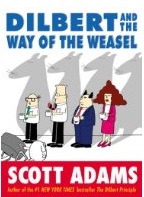The flyleaf describes Douglas Coupland’s new novel as “a lethal joyride into today’s new breed of technogeeks.” I very much enjoyed two of his earlier works, Microserfs and Girlfriend in a Coma, and offer these nuggets from the introduction to his latest novel:
Life is a contest between you and everyone else.
Workshops and seminars are basically financial speed dating for clueless poor people.
TV and the Internet are good because they keep stupid people from spending too much time out in public.
You can’t fake creativity, competence or sexual arousal.
Nobody has ever been happy in a job they obtained by first handing in a resume.
After a week of intense googling, we’ve started to burn out on knowing the answer to everything. God must feel that way all the time. I think people in the year 2020 are going be nostalgic for the sensation of feeling clueless. — pg. 248
I think computers ought to have a key called I’M DRUNK, and when you push it, it prevents you from sending email for twelve hours. — pg. 386

